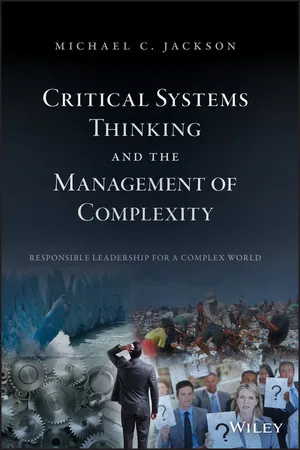
- English
- ePUB (mobile friendly)
- Available on iOS & Android
Critical Systems Thinking and the Management of Complexity
About this book
From the winner of the INCOSE Pioneer Award 2022
The world has become increasingly networked and unpredictable. Decision makers at all levels are required to manage the consequences of complexity every day. They must deal with problems that arise unexpectedly, generate uncertainty, are characterised by interconnectivity, and spread across traditional boundaries. Simple solutions to complex problems are usually inadequate and risk exacerbating the original issues.
Leaders of international bodies such as the UN, OECD, UNESCO and WHO — and of major business, public sector, charitable, and professional organizations — have all declared that systems thinking is an essential leadership skill for managing the complexity of the economic, social and environmental issues that confront decision makers. Systems thinking must be implemented more generally, and on a wider scale, to address these issues.
An evaluation of different systems methodologies suggests that they concentrate on different aspects of complexity. To be in the best position to deal with complexity, decision makers must understand the strengths and weaknesses of the various approaches and learn how to employ them in combination. This is called critical systems thinking. Making use of over 25 case studies, the book offers an account of the development of systems thinking and of major efforts to apply the approach in real-world interventions. Further, it encourages the widespread use of critical systems practice as a means of ensuring responsible leadership in a complex world.
The INCOSE Pioneer Award is presented to someone who, by their achievements in the engineering of systems, has contributed uniquely to major products or outcomes enhancing society or meeting its needs. The criteria may apply to a single outstanding outcome or a lifetime of significant achievements in effecting successful systems.
Comments on a previous version of the book:
Russ Ackoff: 'the book is the best overview of the field I have seen'
JP van Gigch: 'Jackson does a masterful job. The book is lucid ...well written and eminently readable'
Professional Manager (Journal of the Chartered Management Institute): 'Provides an excellent guide and introduction to systems thinking for students of management'
Frequently asked questions
- Essential is ideal for learners and professionals who enjoy exploring a wide range of subjects. Access the Essential Library with 800,000+ trusted titles and best-sellers across business, personal growth, and the humanities. Includes unlimited reading time and Standard Read Aloud voice.
- Complete: Perfect for advanced learners and researchers needing full, unrestricted access. Unlock 1.4M+ books across hundreds of subjects, including academic and specialized titles. The Complete Plan also includes advanced features like Premium Read Aloud and Research Assistant.
Please note we cannot support devices running on iOS 13 and Android 7 or earlier. Learn more about using the app.
Information
Part I
Systems Thinking in the Disciplines
Mark this well, you proud men of action: You are nothing but the unwitting agents of the men of thought who often, in quiet self‐effacement, mark out most exactly all your doings in advance(Heine 1834)
1
Philosophy
1.1 Introduction
1.2 Kant
My senses receive 400 thousand million bits of data every second. My brain only deals with 2000 bits per second so I only notice a very small fraction – a half a millionth of one percent – of what I see, hear and smell. More extraordinary still is the observation that the 100 bits per second that trigger my visual perception are not enough to form any image of what is going on around me. My brain fills in the deficiency. It is hard to defend any claim to an objective view under such circumstances.(Armson 2011, loc. 975)
Table of contents
- Cover
- Table of Contents
- Dedication
- Preface
- Introduction
- Part I: Systems Thinking in the Disciplines
- Part II: The Systems Sciences
- Part III: Systems Practice
- Part III: Type A Systems Approaches for Technical Complexity
- Part III: Type B Systems Approaches for Process Complexity
- Part III: Type C Systems Approaches for Structural Complexity
- Part III: Type D Systems Approaches for Organizational Complexity
- Part III: Type E Systems Approaches for People Complexity
- Part III: Type F Systems Approaches for Coercive Complexity
- Part IV: Critical Systems Thinking
- Conclusion
- References
- Index
- End User License Agreement